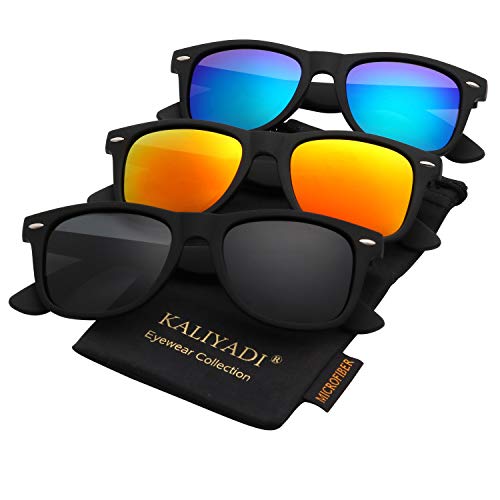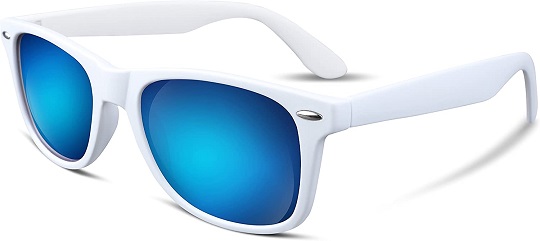Local Storage seems to be disabled in your browser.
For the best experience on our site, be sure to turn on Local Storage in your browser.
5 Key Factors to Consider When Buying Sunglasses
Browse All Tags

#5 Important Things You Should Know When Choosing Sunglasses
Sunglasses are not just a fashion accessory, they are also an important tool to protect your eyes from harmful UV rays. However, with so many options available, it can be overwhelming to choose the right pair. Here are 5 important things you should know when choosing sunglasses.
1. Look for 100% UV Protection
The most important factor to consider when choosing sunglasses is the level of UV protection they offer. Look for sunglasses that provide 100% UV protection, which means they block both UVA and UVB rays. This will help prevent eye damage and reduce the risk of cataracts and other eye conditions.
2. Consider the Lens Color
The color of the lenses can affect how well you see and how comfortable your eyes feel in different lighting conditions. Gray lenses are a good all-around choice, while brown or amber lenses can enhance contrast and depth perception. Green lenses can provide a more natural color balance, and yellow lenses can improve visibility in low-light conditions.
3. Choose the Right Frame Style
The right frame style can not only enhance your look but also provide comfort and durability. Look for frames that fit well and feel comfortable on your face. Consider the shape of your face and choose a style that complements your features. Also, consider the material of the frame, such as plastic or metal, and choose one that suits your lifestyle and needs.
4. Polarized vs. Non-Polarized Lenses
Polarized lenses can reduce glare and improve visibility in bright sunlight, making them a popular choice for outdoor activities such as fishing and boating. However, they can also make it difficult to see certain digital screens, such as those on your phone or dashboard. Non-polarized lenses are a good choice for everyday wear and can still provide adequate UV protection.
5. Price vs. Quality
While it may be tempting to choose a cheaper pair of sunglasses, investing in a higher-quality pair can provide better protection and durability in the long run. Look for sunglasses that are well-made and have a solid warranty. Consider the brand reputation and read reviews from other customers to ensure you are getting good value for your money.
Polarization Importance in Glasses and Its Effect on Eye Protection and Health

Polarized glasses are becoming increasingly popular among people who spend a lot of time outdoors. These glasses have a special property that helps to reduce glare and improve visual clarity. The property of polarization in glasses is achieved by adding a special filter to the lenses that block out certain types of light waves. This filter is designed to only allow light waves that are oriented in a specific direction to pass through the lens.
Protection from Harmful UV Rays
One of the primary benefits of polarized glasses is their ability to protect the eyes from harmful UV rays. When light waves reflect off surfaces such as water, snow, or pavement, they become polarized and oriented in a horizontal direction. This creates a glare that can be not only annoying but also harmful to the eyes. Polarized glasses have a special filter that blocks these horizontally oriented light waves, reducing glare and preventing eye strain. Additionally, polarized glasses can block up to 100% of UV rays, which can cause long-term damage to the eyes, including cataracts and macular degeneration.
Improved Visual Clarity and Comfort
Another benefit of polarized glasses is their ability to improve visual clarity and comfort. By reducing glare, polarized glasses can enhance contrast and make colors appear more vibrant. This can be especially helpful for activities such as driving, fishing, or skiing, where visual clarity is essential. Additionally, polarized glasses can reduce eye strain and fatigue, making them more comfortable to wear for extended periods.
Potential Drawbacks and Considerations
While polarized glasses offer many benefits, there are also some potential drawbacks and considerations to keep in mind. For example, polarized glasses can make it difficult to see certain digital screens, such as those on smartphones or GPS devices. Additionally, polarized glasses can make it harder to see in low-light conditions, such as at dusk or dawn. Finally, it's important to note that not all polarized glasses are created equal, and some may not provide adequate UV protection or may distort colors. Therefore, it's essential to choose high-quality polarized glasses from a reputable manufacturer and to consult with an eye care professional if you have any concerns about your eye health.
In conclusion, choosing the right pair of sunglasses is important for protecting your eyes and enhancing your style. Remember to look for 100% UV protection, consider the lens color and frame style, choose between polarized and non-polarized lenses, and invest in a quality pair that will last. By following these tips, you can find the perfect pair of sunglasses for your needs.
Share this post














Comments